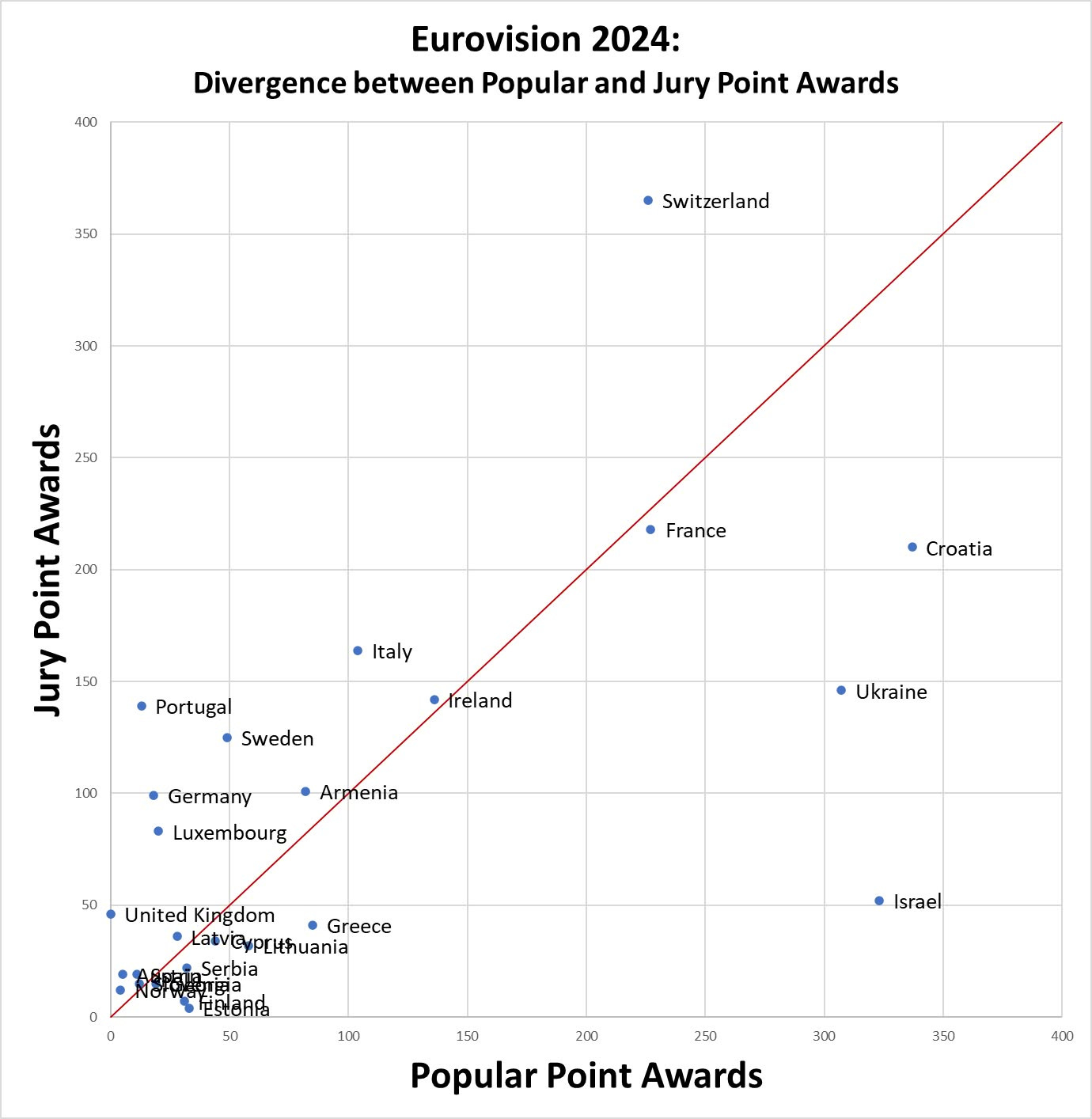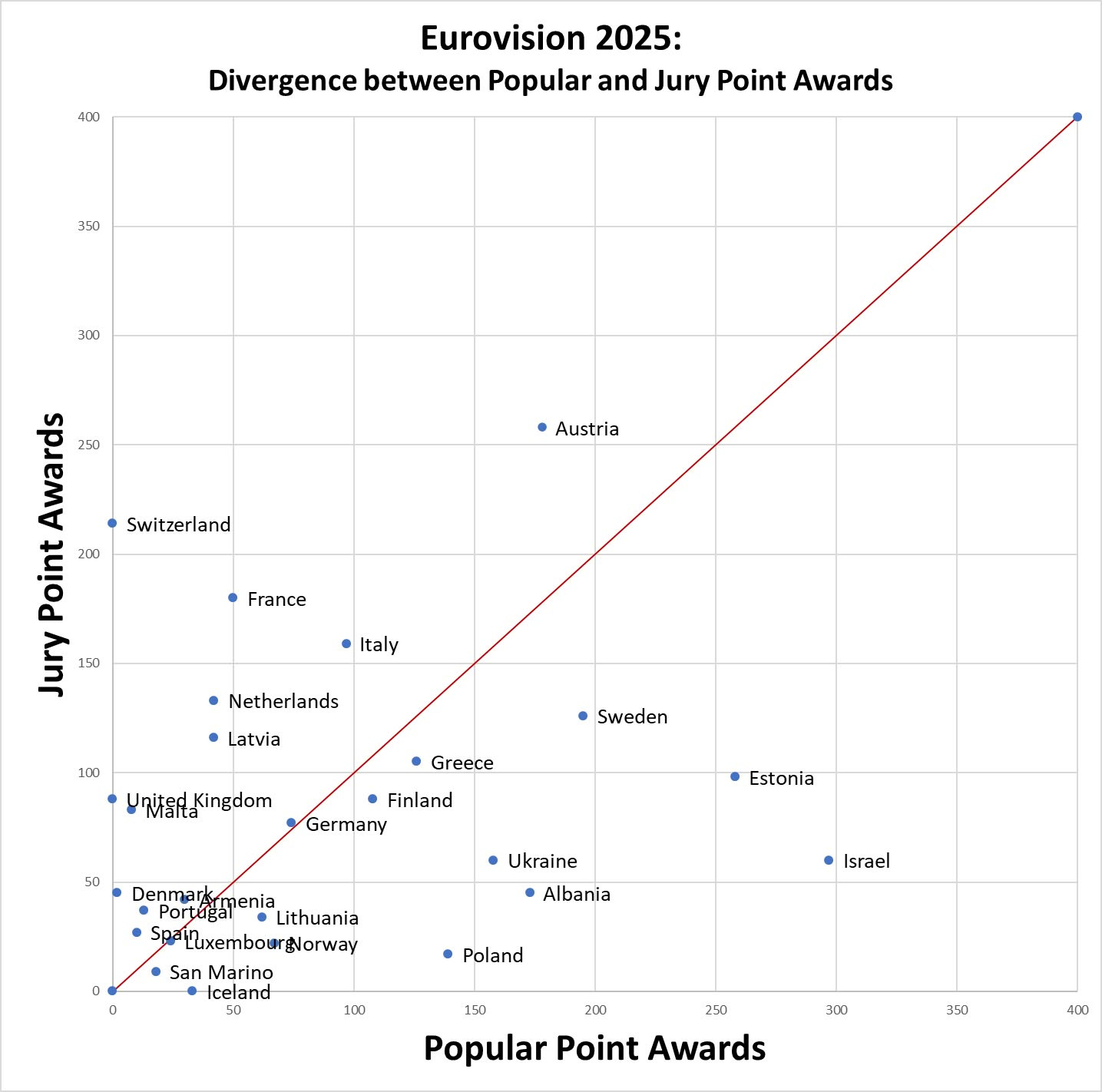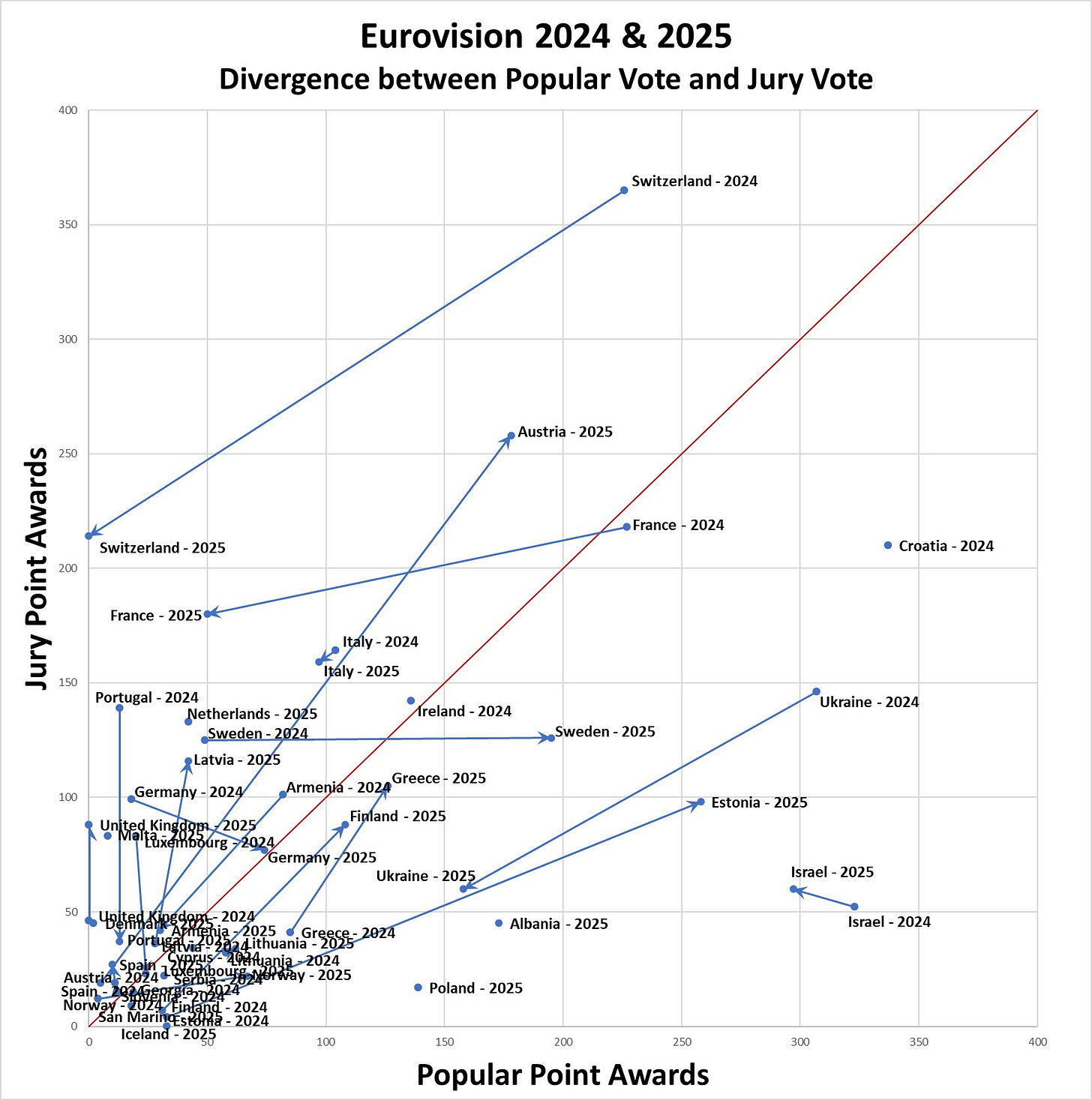The Elites Are Revolting
The annual Eurovision contest continues to reveal divergence between the politics and preferences of the self-anointed elites and those of the European yeomanry.
There was a time when the annual Eurovision contest—“A Song for Europe”—amounted to the Superbowl celebration of European Kitsch and camp. It was all, as far as I can tell, just good fun. At some point, however, it turned into more of a political event, and, indeed, one can spend $61.99 on a scholarly edited volume about just that: A Song for Europe: Popular Music and Politics in the Eurovision Song Contest (2007):
The world's largest and longest-running song competition, the Eurovision Song Contest is a significant and extremely popular media event throughout the continent and abroad. The Contest is broadcast live in over 30 countries with over 100 million viewers annually. Established in 1956 as a televised spectacle to unify postwar Western Europe through music, the Contest features singers who represent a participating nation with a new popular song. Viewers vote by phone for their favourite performance, though they cannot vote for their own country's entry…
[V]oting patterns expose deep-seated alliances and animosities among participating countries. Here, an international group of scholars from a variety of disciplines, including musicology, communications, history, sociology, English and German studies, explore how the contest sheds light on issues of European politics, national and European identity, race, gender and sexuality, and the aesthetics of camp... The essays in this collection often contradict this assumption, demonstrating that the contest has actually been a significant force and forecaster for social, cultural and political transformations in postwar Europe.
The book description accords with my own formative understanding of the Eurovision contest, although I admit to not having followed or studied the Eurovision phenomenon closely. I did, however, take some interest in the 2024 contest, because there was some question of how the Israeli contribution to the contest would be accepted given the politics of the post-October 7 experience and given the event was hosted in Malmö, Sweden, a city that hosts a large Muslim population. Would there be violence? Would the Israeli performers be safe? Would Malmö 2024 exhibit some of the energy of München 1972?
One thing I got out of the 2024 contest was that the European yeomanry affirmatively went out of its way to reject the anti-Israeli sentiment more prominent among the self-anointed elites. How would we know this? The voting scheme features not just votes from the public but also from the official “jury.” In both 2024 and 2025, the voting scheme assigned 50.67% of the mass of votes to the “Public” and the remaining 49.33% of the mass of votes to the “Jury.”
In both 2024 and 2025, one can see important divergence between the Jury vote and the Public vote… as well as some points of agreement. The 2024 contest featured some Trans-rights content as well as much of the pseudo-Satanic and syphilitic content of the sort we had been treated to in Superbowl halftime shows and music awards programs. Exemplars would include last year’s contributions from Ireland and the UK. Over the last few years, Contest content has also made contact with the wars in Ukraine and in the Gaza. Russia has not been permitted to participate in the Contest since 2021.
I reproduce here a version of a graph that I had posted last year in an essay.
The graph maps points awarded by “Jury” against points awarded by the “Public.” Points above the 45-degree line (the red line) indicate contributions favored more heavily by the Jury than the Public. Points below the 45-degree line indicate contributions disfavored more by the Jury than the Public.
In 2024, Croatia, Ukraine and Israel—especially Israel—stood out as heavily favored by the Public but much less favored by the Jury. Switzerland, meanwhile, garnered much Public support but was much more heavily favored by the Jury.
Switzerland won the whole thing by garnering the highest sum of Public and Jury point awards. The Swiss installment featured a be-yourself, trans-friendly ethic, so it was not the case that the Public was averse to that kind of thing. The Swiss production itself was inoffensive.
The Irish installment was explicitly offensive, and it did attract about as much support from the Public as from the Jury. The Israeli installment stands out for having secured heavy Public support but very modest Jury support. Only the installment from Croatia garnered higher Public support.
Compare the 2024 results to the 2025 results:
The Israeli contribution secured just about as much Public support and Jury support as last year. It remained heavily favored by the Public and largely rejected by the Jury. Overall, Israel secured the most Public votes but narrowly lost out to Austria in the final vote totals in that Austria secured an appreciable volume of the Public vote and was much more heavily favored by the Jury.
The following graph combines the data from 2024 and 2025:
The arrows indicate the change in Jury and Public vote totals between 2024 and 2025, although there are some number of singletons in that not all countries were featured in both the 2024 and 2025 Eurovision “finals.”
The biggest gainers from 2024 to 2025 seem to be Austria, Estonia, Sweden, Finland and Greece. The biggest losers (excluding 2024 finalists that failed to make it into the 2025 final competition) were Switzerland, France, Ukraine, and Portugal. Croatia scored very well in 2024 but failed to make the 2025 final. Israel and Italy only shifted marginally. The UK failed again to garner any Public points but improved its standing with the Jury.
So, what to make of this? What I get out of all of it is that Establishment preferences and politics, as reflected by the Jury vote, tend to deviate in important ways from preferences and politics of the European yeomanry. The 2025 competition seemed to expunge most (almost all?) of the sexual politics and Satanic content. The contributions I did take time to view tended to be cleaner and crisper. That said, Establishment opinion seems to line-up with anti-Israeli sentiment—but not that of the Public.
What to make of that? That the people on the street are eager to push back against all of the pro-Islamist propaganda? And, maybe they are getting tired of paying Ukrainian elites to continue to send the Ukrainian yeomanry into the high-tech killing fields of southeastern Ukraine? Has the Eurovision vote become an opportunity for the European yeomanry to demonstrate to the Establishment that its propaganda on all manufactured issues—Trannyism, Ukraine, Israel, the Latest Thing—is just that: manufactured propaganda?






Some fascinating insights there, thank you.
I am encouraged by the public vote for Israel. It was beginning to look like the whole world was turning anti-Semitic. I am not Jewish.